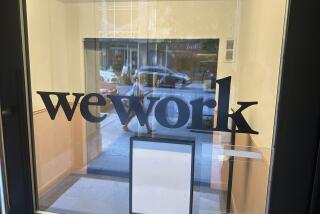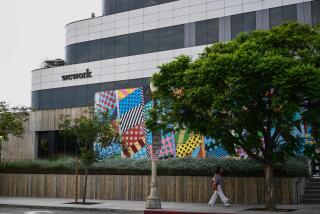Muzak isn’t playing a dirge
- Share via
FORT MILL, S.C. — About the only quiet places in Muzak Holdings headquarters are, believe it or not, the building’s elevators.
The omission is intentional. Muzak wants visitors to know that the company has abandoned those milquetoast renditions of pop songs that got toes tapping involuntarily in elevators everywhere.
But while Muzak spent years reinventing itself by selling restaurants and retail stores custom playlists -- of the original songs, not elevator-music versions -- the company sank into debt. Now Muzak is restructuring under Chapter 11 bankruptcy protection.
“This was a financial situation that was looming for 10 years,” said Bruce McKagan, Muzak’s vice president of content services. “This just happened at a devastating time for everyone.”
Still, the company says it expects to emerge from bankruptcy fairly quickly as it restructures its $436-million debt. Muzak’s filing cited assets of $324 million. And Muzak has been cleared to keep operating its library of more than 2.6 million songs.
Muzak will come out of Chapter 11 into a tough spot, though, as retailers close and fewer new potential clients emerge, according to Matthew Dundon, managing director at Miller Tabak Roberts Securities in New York. Muzak’s 2008 revenue of $249 million was essentially flat from 2007.
“The wind in 2009 is anywhere but at their back,” Dundon said.
Muzak -- which switched in the mid-1980s from cheesy remakes to original songs -- accumulated much of its debt by buying out franchisees who had been selling playlists to retail outlets and offices. Muzak also pays more than $26 million annually in royalties, licensing and other fees associated with acquiring music for playlists.
Those tunes envelop Muzak’s workers the moment they pull into the parking lot. On one recent day, Prince’s “Kiss” rang out, a song on an adult R&B; playlist called “The Boulevard.”
The 110,000-square-foot headquarters is designed like a European village, complete with a central square for concerts by local acts. Wide walkways link sections of the complex. In one building, thousands of plain white shoe boxes line the walls, storing the numbered CDs from which songs have been taken.
Muzak’s audio architects, as they’re known, customize music mixes for such clients as Ann Taylor, McDonald’s and Caribou Coffee.
It’s part science, part art, accomplished with the Well, Muzak’s digital library, from which employees select optimal songs for sipping lattes or hawking lawn mowers. Name an artist and Muzak’s got it. It has nearly 900 Beatles titles, and close to 2,000 Elvis songs, all ready to be put on a playlist and sent to clients.
Audio architect Steven Pilker explains that sometimes a customer wants a simple playlist -- say, all country and western. But much of the time, Muzak’s assignment is a broader mix.
“That’s the fun part,” said Pilker.
Muzak was founded in 1934, though its roots go back earlier, to a company called Wired Radio Inc. It was founded by Maj. Gen. George Owen Squier, an inventor who patented a way to play a phonograph over electric power lines during World War I.
The company could not compete with radio for residential customers and instead targeted restaurants and hotels. Then elevators brought an opportunity.
As skyscrapers added lifts for speedier travel, their riders were often scared by the height and the contraption’s rattling. Joseph Lanza, author of “Elevator Music: A Surreal History of Muzak, Easy-Listening, and Other Moodsong,” wrote that elevators evoked fears of “motion sickness and snapping cables.” Music helped calm people.
Muzak’s business was boosted further by studies in the 1930s. A British government report found workers were more productive and resented their jobs less when they were met with music in the workplace each morning. And the Stevens Institute of Technology found that “functional music” at work cut absenteeism by 88% and reduced early departures by 53%.
During World War II, Muzak piped patriotic music into more than 1,400 factories turning out military equipment. Over the next four decades, Muzak became synonymous with the mushy background music of dentists’ offices and oh-so-many elevator rides.
It’s an image the company hasn’t completely shed.
“When we sit down some clients, we always have to deal with the elephant, the elevator, in the room,” McKagan said with a chuckle.
The company continues to research the best songs to reduce stress or to spur shoppers to buy something. A blare of horns in a song, for instance, is thought to help focus a potential consumer walking through a department store.
There’s also a growing voice sector, with 125 vocal talents who have recorded more than 32,000 tailored messages in Muzak’s studios. Those are the messages welcoming shoppers to a store or asking people to hold for customer service.
But it’s music that truly drives Muzak.
About 100 of the 500 employees here perform in their spare time. McKagan’s brother, ex-Guns N’ Roses bassist Duff McKagan, contributed a solo track to a CD of employees’ originals.
Pilker, the audio architect, said he had faith in the company’s future.
“It’s music,” he said. “People will always like to listen to music.”


